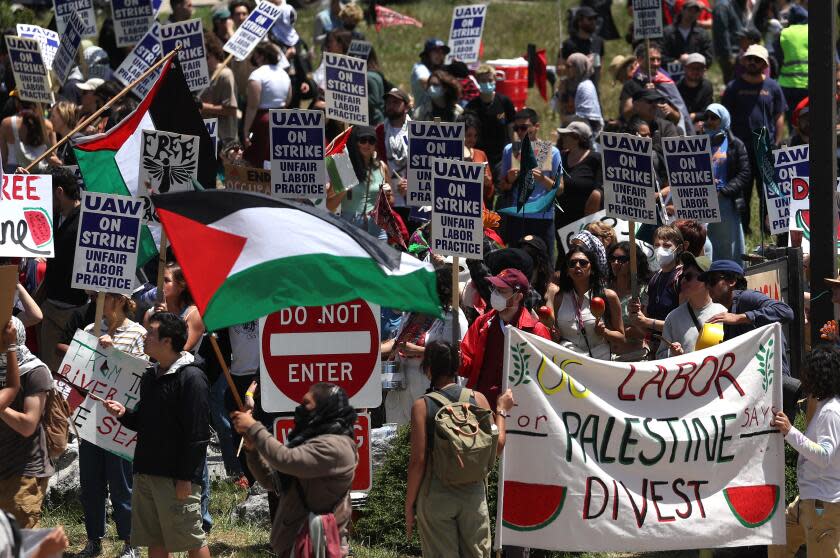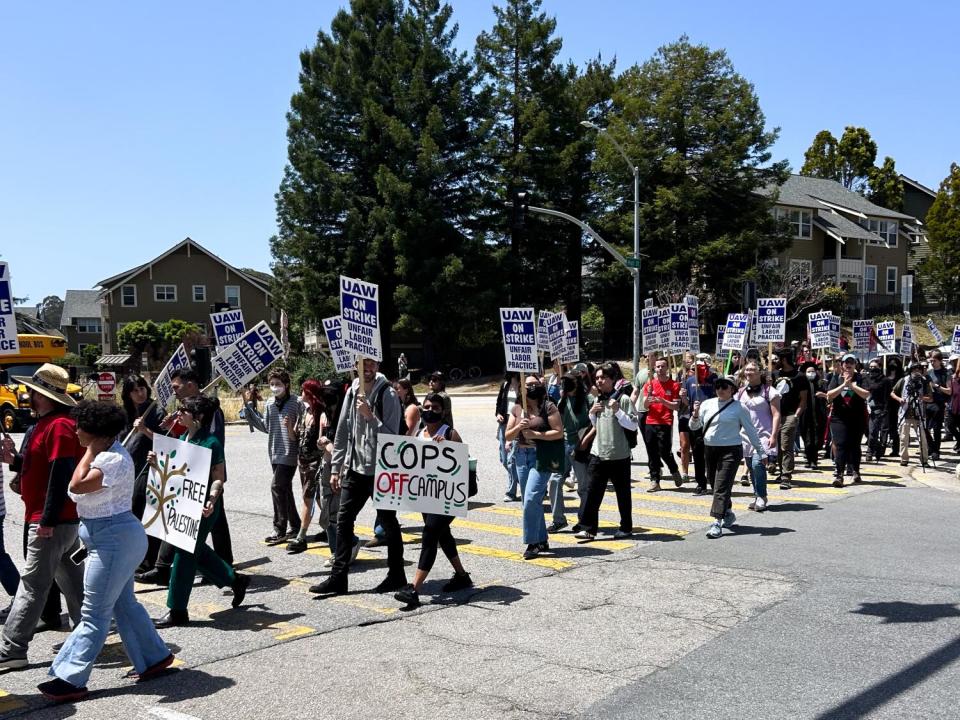Pro-Palestinian protesters move UC Santa Cruz encampment, join striking workers

As hundreds of striking academic workers walked a picket line at UC Santa Cruz on Monday, alleging the University of California's response to pro-Palestinian demonstrators has been hostile, a group of protesters moved their encampment across campus.
Protesters relocated their days-old encampment — including tents and sleeping bags — to the entrance of the university along High Street to be closer to the striking academic workers, who allege their free speech rights were violated when peaceful demonstrations at other campuses were met with violence.
"Long live the people's university," read some of the signs erected near more than two dozen tents erected near the campus entrance. Another read, "No one is free until we are all free."
The strike, which was announced Friday, is the first in a potential series of labor actions at colleges across the UC system. Union leaders claim the response to campus protests amounted to unfair labor practices and are demanding that UC officials negotiate with pro-Palestinian demonstrators.
The strike was voted on by members of United Auto Workers Local 4811, which represents about 48,000 graduate student teacher assistants, tutors, researchers and other academic workers.
Read more: UC academic workers' strike begins as pro-Palestinian activism enters new phase
On Monday, students and other pro-Palestinian supporters moved their encampment across campus, joining striking workers along the main road to UC Santa Cruz where they would be more visible. A large pile of pillows and sleeping bags, moved from the old encampment, sat atop a tarp that had been placed on the ground Monday afternoon at the new location.
"We want to put more pressure on the UC," said a media liaison for protesters known as Shiv, a first-year politics major at the university. "Now we're ready to move and to force them to pay attention to us."

UC officials have called the job action illegal, arguing that academic workers have a valid contract with a no-strike clause. They have filed an unfair practice charge against the union.
The strike comes amid an onslaught of campus encampments set up by students and other demonstrators, who have, at times, occupied college buildings while calling for an end to Israel's military attacks in Gaza.
In California, some of those encampments have been cleared with a significant police presence. At UCLA, more than 200 people were arrested in a smoke-filled clash with police that spanned two days. At UC Irvine, law enforcement agencies from across Orange County wearing riot gear dismantled a camp and arrested 47 protesters.
Police also were called to take down encampments at UC San Diego, Cal Poly Humboldt and USC. By contrast, demonstrators at UC Riverside and UC Berkeley reached agreements with university officials to take down the camps without any police interaction.
Read more: Photos: Tensions grow as pro-Palestinian demonstrations on college campuses continue
Students at UC Davis have managed to keep their encampment up for nearly two weeks without any clashes with the university.
Protesters at UC Santa Cruz have remained on campus for about three weeks. "I am appalled by what Israel is doing to Palestine," Shiv said Monday.
Some student groups that have taken part in the encampment applauded the strike and noted on social media they would join workers on the picket line. One of them, Justice in Palestine, called on the union to authorize more strikes.
"The path forward is clear: UAW 4811 must immediately call a strike at all University of California campuses," the student group posted Monday on Instagram.
Group members called for a divestment from Israel and amnesty for those involved in negotiations.
"This must be a strike for Palestine," they wrote.
Striking workers are demanding that UC officials negotiate with pro-Palestinian demonstrators and grant amnesty to those who might face disciplinary action.
As part of their reason for the strike, the union cited an attack on demonstrators at the UCLA encampment and the arrest of union members there. Union officials called the incident "an assault on our fundamental right to free expression."
Posts on social media suggest that the strike might spread to other UC campuses, including UCLA, UC Irvine, UC Davis and UC San Diego.
Read more: UC officials charge that academic workers' strike over pro-Palestinian protests is illegal
On campus, some students said the climate has been "a bit tense."
"It can be a little frustrating or stressful not having the [teaching assistants] there and the uncertainty of not knowing what our grades are going to be," said Lux Morgan, 18, an art and design games and playable media major. "I am in full support of what they are striking for. The use of police violence is really not OK."
Jesse Johnson, 19, a marine biology major, said he also supports the protests — even with the uncertainty about his grades.
"I think it will work out in the end," he said. "I can't imagine they would necessarily punish students."
This story originally appeared in Los Angeles Times.

